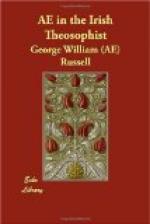This idea of man’s expansion into divinity, which is in the highest teaching of every race, is one which shone like a star at the dawn of our Celtic history also. Hero after hero is called away by a voice ringing out of the land of eternal youth, which is but a name for the soul of earth, the enchantress and mother of all. There as guardians of the race they shed their influence on the isle; from them sprang all that was best and noblest in our past, and let no one think but that it was noble. Leaving aside that mystic sense of union with another world and looking only at the tales of battle, when we read of heroes whose knightly vows forbade the use of stratagem in war, and all but the equal strife with equals in opportunity; when we hear of the reverence for truth among the Fianna, “We the Fianna of Erin never lied, falsehood was never attributed to us”—a reverence for truth carried so far that they could not believe their foemen even could speak falsely—I say that in these days when our public life is filled with slander and unworthy imputation, we might do worse than turn back to that ideal Paganism of the past, and learn some lessons of noble trust, and this truth that greatness of soul alone insures final victory to us who live and move and have our being in the life of God.
In hoping for such another day I do not of course mean the renewal of the ancient order, but rather look for the return of the same light which was manifest in the past. For so the eternal Beauty brings itself to the memory of man from time to time brooding over nations, as in the early Aryan heart, suffusing life and thought with the sun-sense of pervading Deity, or as in Greece where its myriad rays, each an intuition of loveliness, descended and dwelt not only in poet, sage and sculptor, but in the general being of the people. What has been called the Celtic renaissance in literature is one of the least of the signs. Of far more significance is the number of strange, dreamy children one meets, whose hearts are in the elsewhere, and young people who love to brood on the past, I speak of which is all the world to them. The present has no voice to interpret their dreams and visions, the enraptured solitude by mountain or shore, or what they feel when they lie close pressed to the bosom of the earth, mad with the longing for old joys, the fiery communion of spirit with spirit, which was once the privilege of man. These some voice, not proclaiming an arid political propaganda, may recall into the actual: some ideal of heroic life may bring them to the service of their kind, and none can serve the world better than those who from mighty dreams turn exultant to their realisation: who bring to labour the love, the courage, the unfailing hope, which they only possess who have gone into the hidden nature and found it sweet at heart.




